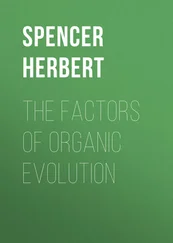When, leaving the development of single plants and animals, we pass to that of the Earth's flora and fauna, the course of our argument again becomes clear and simple. Though, as was admitted in the first part of this article, the fragmentary facts Paleontology has accumulated, do not clearly warrant us in saying that, in the lapse of geologic time, there have been evolved more heterogeneous organisms, and more heterogeneous assemblages of organisms, yet we shall now see that there must ever have been a tendency towards these results. We shall find that the production of many effects by one cause, which as already shown, has been all along increasing the physical heterogeneity of the Earth, has further involved an increasing heterogeneity in its flora and fauna, individually and collectively. An illustration will make this clear. Suppose that by a series of upheavals, occurring, as they are now known to do, at long intervals, the East Indian Archipelago were to be, step by step, raised into a continent, and a chain of mountains formed along the axis of elevation. By the first of these upheavals, the plants and animals inhabiting Borneo, Sumatra, New Guinea, and the rest, would be subjected to slightly modified sets of conditions. The climate in general would be altered in temperature, in humidity, and in its periodical variations; while the local differences would be multiplied. These modifications would affect, perhaps inappreciably, the entire flora and fauna of the region. The change of level would produce additional modifications: varying in different species, and also in different members of the same species, according to their distance from the axis of elevation. Plants, growing only on the sea-shore in special localities, might become extinct. Others, living only in swamps of a certain humidity, would, if they survived at all, probably undergo visible changes of appearance. While still greater alterations would occur in the plants gradually spreading over the lands newly raised above the sea. The animals and insects living on these modified plants, would themselves be in some degree modified by change of food, as well as by change of climate; and the modification would be more marked where, from the dwindling or disappearance of one kind of plant, an allied kind was eaten. In the lapse of the many generations arising before the next upheaval, the sensible or insensible alterations thus produced in each species would become organized—there would be a more or less complete adaptation to the new conditions. The next upheaval would superinduce further organic changes, implying wider divergences from the primary forms; and so repeatedly. But now let it be observed that the revolution thus resulting would not be a substitution of a thousand more or less modified species for the thousand original species; but in place of the thousand original species there would arise several thousand species, or varieties, or changed forms. Each species being distributed over an area of some extent, and tending continually to colonize the new area exposed, its different members would be subject to different sets of changes. Plants and animals spreading towards the equator would not be affected in the same way as others spreading from it. Those spreading towards the new shores would undergo changes unlike the changes undergone by those spreading into the mountains. Thus, each original race of organisms, would become the root from which diverged several races differing more or less from it and from each other; and while some of these might subsequently disappear, probably more than one would survive in the next geologic period: the very dispersion itself increasing the chances of survival. Not only would there be certain modifications thus caused by change of physical conditions and food, but also in some cases other modifications caused by change of habit. The fauna of each island, peopling, step by step, the newly-raised tracts, would eventually come in contact with the faunas of other islands; and some members of these other faunas would be unlike any creatures before seen. Herbivores meeting with new beasts of prey, would, in some cases, be led into modes of defence or escape differing from those previously used; and simultaneously the beasts of prey would modify their modes of pursuit and attack. We know that when circumstances demand it, such changes of habit do take place in animals; and we know that if the new habits become the dominant ones, they must eventually in some degree alter the organization. Observe now, however, a further consequence. There must arise not simply a tendency towards the differentiation of each race of organisms into several races; but also a tendency to the occasional production of a somewhat higher organism. Taken in the mass these divergent varieties which have been caused by fresh physical conditions and habits of life, will exhibit changes quite indefinite in kind and degree; and changes that do not necessarily constitute an advance. Probably in most cases the modified type will be neither more nor less heterogeneous than the original one. In some cases the habits of life adopted being simpler than before, a less heterogeneous structure will result: there will be a retrogradation. But it must now and then occur, that some division of a species, falling into circumstances which give it rather more complex experiences, and demand actions somewhat more involved, will have certain of its organs further differentiated in proportionately small degrees—will become slightly more heterogeneous. Thus, in the natural course of things, there will from time to time arise an increased heterogeneity both of the Earth's flora and fauna, and of individual races included in them. Omitting detailed explanations, and allowing for the qualifications which cannot here be specified, we think it is clear that geological mutations have all along tended to complicate the forms of life, whether regarded separately or collectively. The same causes which have led to the evolution of the Earth's crust from the simple into the complex, have simultaneously led to a parallel evolution of the Life upon its surface. In this case, as in previous ones, we see that the transformation of the homogeneous into the heterogeneous is consequent upon the universal principle, that every active force produces more than one change.
The deduction here drawn from the established truths of geology and the general laws of life, gains immensely in weight on finding it to be in harmony with an induction drawn from direct experience. Just that divergence of many races from one race, which we inferred must have been continually occurring during geologic time, we know to have occurred during the pre-historic and historic periods, in man and domestic animals. And just that multiplication of effects which we concluded must have produced the first, we see has produced the last. Single causes, as famine, pressure of population, war, have periodically led to further dispersions of mankind and of dependent creatures: each such dispersion initiating new modifications, new varieties of type. Whether all the human races be or be not derived from one stock, philology makes it clear that whole groups of races now easily distinguishable from each other, were originally one race—that the diffusion of one race into different climates and conditions of existence, has produced many modified forms of it. Similarly with domestic animals. Though in some cases—as that of dogs—community of origin will perhaps be disputed, yet in other cases—as that of the sheep or the cattle of our own country—it will not be questioned that local differences of climate, food, and treatment, have transformed one original breed into numerous breeds now become so far distinct as to produce unstable hybrids. Moreover, through the complication of effects flowing from single causes, we here find, what we before inferred, not only an increase of general heterogeneity, but also of special heterogeneity. While of the divergent divisions and subdivisions of the human race many have undergone changes not constituting an advance; while in some the type may have degraded; in others it has become decidedly more heterogeneous. The civilized European departs more widely from the vertebrate archetype than does the savage. Thus, both the law and the cause of progress, which, from lack of evidence, can be but hypothetically substantiated in respect of the earlier forms of life on our globe, can be actually substantiated in respect of the latest forms. [4]
Читать дальше












